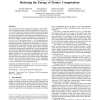Free Online Productivity Tools
i2Speak
i2Symbol
i2OCR
iTex2Img
iWeb2Print
iWeb2Shot
i2Type
iPdf2Split
iPdf2Merge
i2Bopomofo
i2Arabic
i2Style
i2Image
i2PDF
iLatex2Rtf
Sci2ools
ASPLOS
2010
ACM
2010
ACM
Conservation cores: reducing the energy of mature computations
Growing transistor counts, limited power budgets, and the breakdown of voltage scaling are currently conspiring to create a utilization wall that limits the fraction of a chip that can run at full speed at one time. In this regime, specialized, energy-efficient processors can increase parallelism by reducing the per-computation power requirements and allowing more computations to execute under the same power budget. To pursue this goal, this paper introduces conservation cores. Conservation cores, or c-cores, are specialized processors that focus on reducing energy and energy-delay instead of increasing performance. This focus on energy makes c-cores an excellent match for many applications that would be poor candidates for hardware acceleration (e.g., irregular integer codes). We present a toolchain for automatically synthesizing c-cores from application source code and demonstrate that they can significantly reduce energy and energy-delay for a wide range of applications. The c-co...
Related Content
| Added | 17 May 2010 |
| Updated | 17 May 2010 |
| Type | Conference |
| Year | 2010 |
| Where | ASPLOS |
| Authors | Ganesh Venkatesh, Jack Sampson, Nathan Goulding, Saturnino Garcia, Vladyslav Bryksin, Jose Lugo-Martinez, Steven Swanson, Michael Bedford Taylor |
Comments (0)

